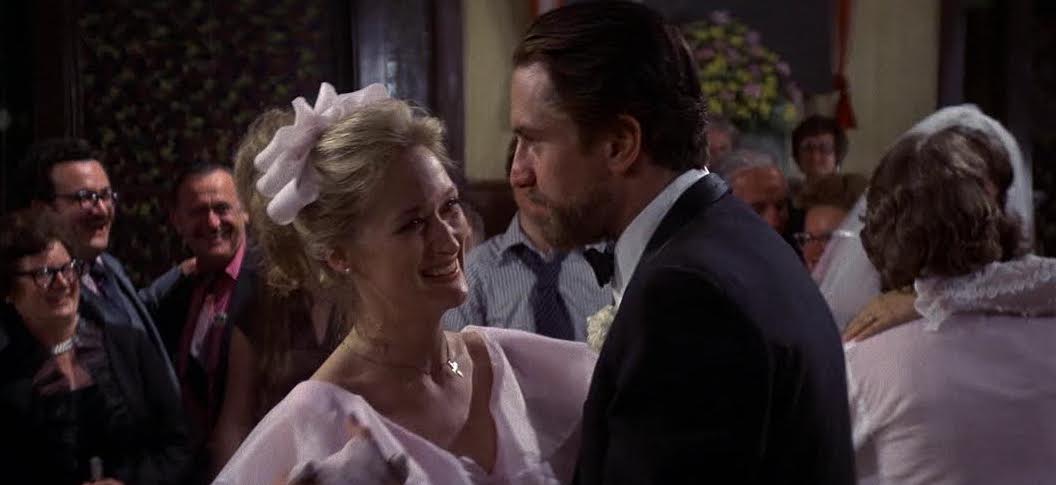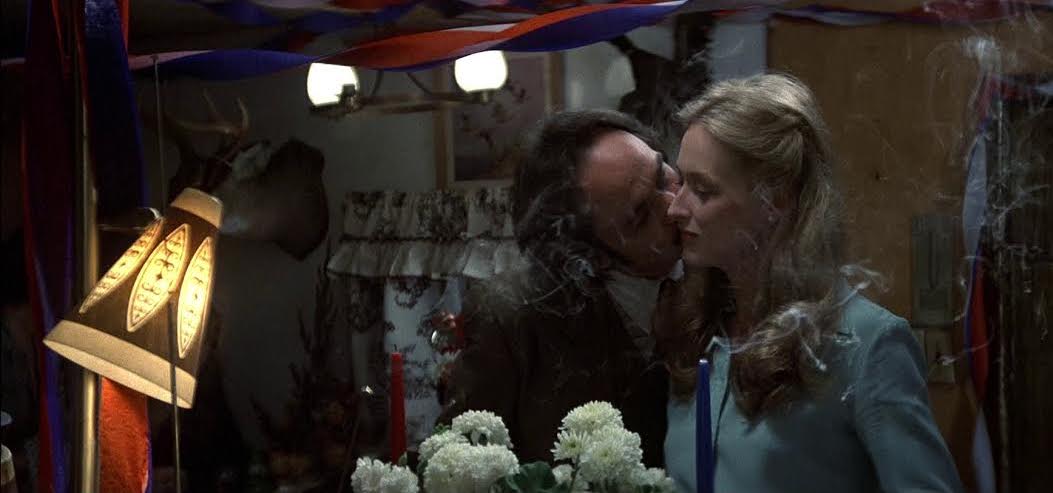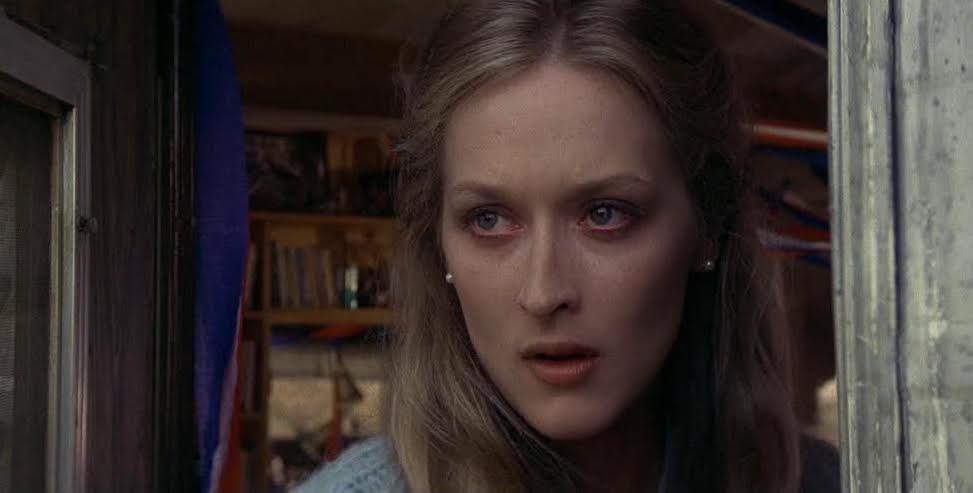Hi, we’re John and Matt and, in case you missed it, we are watching every single feature film starring Meryl Streep.

#2 — Linda, a working-class girl waiting for the return of her fiancé (and her fiancé’s pal) from Vietnam.
JOHN: The Deer Hunter is a mammoth film, both an epic tale of a soldier’s journey to hell and back (and back again), and an intimate communal study. Meryl Streep is Linda, engaged to Nick (Christopher Walken) but in love with his best friend Michael (Robert De Niro). Streep is given an underwritten part and asked to stand-in for ideas about femininity — and often simply femininity itself — in a picture dripping with testosterone. The film carefully takes stock of its male relationships, tracing masculine bravado from the Pennsylvania mines to the roulette dens of Vietnam, both critical of masculinity and uncommonly poignant in uncovering the deep bonds that exist between men. Linda often provides the film’s only tender balm to such machismo, but Streep transforms her Girl Back Home into an uncommonly rich creation. This is no flimsy Anne Marie. Linda is a supernatural creation of intense sincerity, relaxed yet energetic, guarded yet vulnerable, the film’s emotional core and its anxious heartbeat.
The Deer Hunter contains your favorite Meryl Moment, Matthew, right?...
MATTHEW: Probably, although that answer might be different on any given day. When I think about The Deer Hunter, I don’t think about the fraying everyman stoicism of De Niro in what is perhaps the most understated turn of his early heyday. I don’t think about Walken’s Oscar-winning performance, a feat of two deliberately clashing effects, in which the charismatic affability of the Pennsylvania prologue ultimately gives way to an indelibly terrifying display of dead-eyed emotional and mental vacancy. I don’t even think about the unabashed Guignol spectacle of those factually-dubious Russian Roulette scenes nor the barking malevolence of the film’s Vietnamese baddies, who remain troubling depictions that it would be irresponsible to call anything other than “racist.”

No, when I think about The Deer Hunter, all I can really think about are two words and a face. The words are “Oh, Michael.” And the face is, of course, Meryl’s. Honestly, just recalling Streep in this scene, in which De Niro’s Michael returns from Vietnam to an abandoned “Welcome Home” party at which only Linda remains, is enough to break my heart almost instantaneously. “Oh, Michael” is such a simple exclamation, but the ways in which she utters it — first with breathless shock then again with crying and unrestrained affection — gorgeously endow it with all the profundity it needs. In Streep’s mouth, these words soar. Her face becomes a porous map of Linda’s inner emotional workings: relief and elation seem to rise up from the center and then part like two diverging waves until they ultimately encompass the trembling whole. In this single moment and in her entire performance, Streep, still a relatively untested film actress at this point, gives bountiful detail and masterfully-calibrated dynamism to a woman who, by all accounts, she never really respected.
JOHN: As Michael Schulman recounts in "Her Again," a biography of Streep’s early career up to her first Oscar win, Streep openly expressed her reservations about this one-dimensional character. In an interview with The New York Times, Streep observed how Linda is “really far from my own instincts. I’m very much of a fighter myself. So this is very hard for me. I want to break her out of her straitjacket, but of course I can’t even let that possibility show.” To prepare, Streep described how she “thought of all the girls in my high school who waited for things to happen to them. Linda waits for a man to come and take care of her. If not this man, then another man: she waits for a man to make her life happen.”
She may not have respected or even liked Linda, but she certainly endows this tired archetype with unusual specificity, finding the sadness and sympathy for “all the girls in my high school” through a compilation of muted grit, emotional directness, and enthralling desires. In the film’s first act, Streep’s blend of relaxed charm and candid sensuality immediately disarms. When Linda smiles at Michael across the room at the chaotic wedding party, we watch not only her piqued interest in her boyfriend’s best friend but also witness Linda consider the gravity (and impossibility) of such a pursuit. Such moments “dimensionalize” Linda and, at least in my own experience, command more audience investment than any other character in The Deer Hunter. Where else do you find Streep actively working to fill in this character through her own brilliant choices?

MATTHEW: The aforementioned “Oh, Michael!” exclamations and, of course, that quietly frantic touch-up in the storefront window as a newly-returned De Niro exchanges a few words with a passerby have endured as affecting and justly iconic exemplars of American screen acting at its most naturalistic. The latter gesture, in particular, is a perfect distillation of the personal and unpretentious significance that Streep brings to Linda, whose most revealing moments are generally her most solitary. Streep makes us softly but acutely aware of how so much of life is lived in private, in the moments in between moments, when we assume that no one is watching.
You get a sense of this, too, in the scene before this, when Michael enters the trailer after Linda’s ecstatic greeting. She remarks with chirpy affability about how he just missed the other partygoers, even though it’s clear that Linda relishes this alone time. It’s almost as if she’s unwittingly playing housewife, taking his coat and beatifically purring, “Welcome home,” before impulsively reaching up to peck him on the lips. (And considering how De Niro looked in 1978, who can really blame her?) But when she turns away from him, her face blanches with a discomfort and self-chastisement that only we can see. Linda has remembered her real role: a missing soldier’s wife-to-be. She drops the act and puts some distance between her and Michael, dutifully telling him that she had hoped Nick might be with him.
There’s a genuine build-up of suspense to each and every conversation Linda shares with Michael, starting with, as you mentioned, their first interaction during the wedding, when the two are pushed together on the dance floor and then head off on their own to grab a beer at the bar. Cimino expertly handles all of his actors amid the commotion of these early scenes, when character delineation obviously matters most, but Streep and De Niro are truly in a class of their own, each a moth drawn to the other’s blinking flame. Their innocuous dialogue (about Nick and the wedding) is truly besides the point of this encounter, which turns on the pregnant pauses and buzzing body language that signal a flood of desire too uncertain to be released. Streep’s gazes, silences, and squirms write an entire interpersonal history and awaken a tension that’s surely familiar to Linda and Michael but thrillingly new to us.
What exactly would Linda like to say to him? And how much is she willing to risk if only he would make the first move? Streep’s performance continually drives us to wonder about questions like these but never entirely resolves them, even when it seems, much later, that Michael’s future could very well lie with Linda. Are there any other moments where you feel like Streep is playing the “mystery” of Linda, or just exploring the character in ways that Cimino and screenwriter Deric Washburn had never even considered?

JOHN: Well you already stole “Oh, Michael!” but I’ll add that when she later blurts, “I’m so glad you’re alive!” I practically feel her heart pumping in my chest. I also love the homely camaraderie with the supermarket staff sliced into brief moments that nonetheless ground Linda in this community, and her distressing stockroom fit is such an odd yet fascinating glimpse into her frustrations. Streep knows that she has precious time to rally support for and draw attention to Linda, and thus manages to charge even the shortest moments of screen time with a potent sense of empathy, all without an ounce of condescension.
Your use of “mystery,” though, is exactly what I find so captivating throughout Streep’s performance; on the page, there is nothing mysterious about Linda at all, and yet Streep haunts the town, the men, and the film with an ineffable quality, both wise and green, loose and nervous, enlivened and downbeat. She becomes, in short, a complete presence. Streep fills in all the gaps, relays such a particular hometown girl, and yet there is still something mystifying about Linda by the film’s end. What does Linda want from Michael, and how secure does she feel in not only admitting but enacting those desires? How cruelly will the town gossip about her taking up her lover’s best friend after he dies in combat? Is Michael worth all his tortured baggage?
In the tonally chaotic finale, Streep looks at De Niro through heavy, wet eyes and shoots a severe gaze, hinting at an unutterable devastation and heartbreak. This tragic love triangle might finally give Linda an opportunity to express her own agency and define her life apart from Michael or Nick or any other man. Streep’s performance is not exactly the work of a completely rounded character, yet in spite of this Linda remains a character to contemplate by virtue of Streep’s vigorous ordinariness. Do you often think of Linda? What do you think became of her?

MATTHEW: I’ve seen The Deer Hunter twice now and, on my first visit, I remember feeling some sort of critical resistance to Streep’s performance and the overall character of Linda, who has so clearly been given secondary consideration by every filmmaker other than Streep. But Linda lingered in my head and heart for an eerily long time after that initial viewing and upon my return, I couldn’t possibly tell you how I ever put any space between myself and the character. Every single moment of this performance wrecks or enchants me, thanks in largest part to Streep’s ingenious individual choices, which beautifully support the film but also distinguish Linda as someone more curious and compelling than The Girl Back Home. I can’t imagine Linda went on to live anything other than a fairly traditional life, either with Michael or maybe more likely on her own, determined to honor Nick’s memory in self-reproachful solitude. That these are the only options I can honestly envision for Linda is unfortunate, but it doesn’t irk me in the way it used to. No, Linda may not be a woman of particularly great depth. But that doesn’t mean her story couldn’t or shouldn’t matter; quite the contrary. In Streep’s hands, Linda’s story quietly comes to matter most of all.
What say you, reader? Are you as impressed with Streep’s second screen performance, or are you looking ahead to her lead actress days?